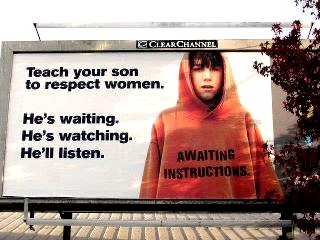“Freedom cannot be achieved unless the women have been emancipated from all forms of oppression” –Nelson Mandela
“Street Harassment is a serious problem. It makes us feel ashamed and afraid unnecessarily. I hate it.”
“Going for a run should not mean going on display.”
“I’ve gone from “queen” to “b*tch” in 6 seconds on the streets of Oakland.” –Voices of women on street harassment.
 By devaluing women verbally, street harassment can contribute to situations that make it ok (in the perpetrator’s mind) to escalate into a physical confrontation, specifically if the advances are rejected.
By devaluing women verbally, street harassment can contribute to situations that make it ok (in the perpetrator’s mind) to escalate into a physical confrontation, specifically if the advances are rejected.
Lately I’ve been doing some training to learn how to help male perpetrators of domestic violence learn non-abusive choices and behaviors for managing domestic conflicts and disputes.
I’ve found that just as domestic violence is about power and control, so is street harassment. And sitting at the root of these ills is male privilege.
With male privilege comes a feeling of entitlement: entitlement to sex, entitlement to being in control, having their needs as a priority, and also the expectation that when a man, or men sexually harasses a woman in public that woman should be happy to be getting some attention.
When their advances are rejected, some men call women all kind of different names in an attempt to get some power back. This name-calling also serves to send a message to women which says that their worth is defined by how satisfied a man is with them.
Living in a culture that has very specific rules and expectations regarding what is feminine and masculine, and one that reinforces in overt and subtle ways the subordination of women contributes to the problem, and many images in the media give the message that its ok to treat women like objects, reinforcing the idea of male entitlement & superiority, and subjugation of women.
Check out this preview for an interesting documentary that examines those images called “Miss Representation.”
Miss Representation 8 min. Trailer 8/23/11 from Miss Representation on Vimeo.
Moving to action
“Allies are needed to fight against every type of oppression. We must use our privileges to level the playing field. Just as people of color should not be solely responsible for ending racism, just as people in the LGBTQ community should not be solely responsible for ending homophobia, women should not be solely responsible for ending sexism in its many forms.” —Excerpted from (N.A.H.) Blog Post: “It’s Not a Compliment, its Harassment“
It’s time to “change the channel” in our minds and actions. Today, many men are still taught in covert and overt ways that being masculine means suppressing emotions and having power over others.
In my training to work to help male perpetrators of domestic violence learn non-abusive choices and actions in managing conflicts in their relationships, we focus on honesty and accountability. That means being honest about the abuse, and holding ourselves accountable for the choices we make.
We also talk about changing the perception that men are entitled to have power “over”, to one in which fosters equality and shared responsibility as they work “with” their partners. Changing that perception involves questioning our status quo.
Down with the “boys will be boys” mentality. Let’s step outside of the box. Who says catcalling a woman in the street and then calling her a b*cth if she ignores you or stands up for herself is what makes you a man? Who says emotional or physical abuse is the “manly” way to assert oneself in conflict?
It’s time to create a new definition of “manhood”: one which values non-violence, respect, and equity over domination and control.
Men have a lot to gain, but more importantly a lot to give by working against street harassment and other forms of sexism and working toward gender equality.
We can play critical roles in challenging it not only in our personal lives, but in institutions as well. We can teach our young men that it’s NOT ok to harass or hit women. We can also offer counter-narratives that teach them to value the women in their lives for who they are.
We can also be honest and hold ourselves accountable by challenging the “conventional wisdom” and working against giving ourselves an out by assuming “that’s just the way it is and always will be” when it comes facing street harassment and other forms of sexism.
Men can also remain honest and accountable by acknowledging their own privilege. Although we have the privilege to not have to worry about being catcalled on the street, I think a part of being a good ally is staying in the conversation, and doing whatever we can in our lives to use our influence to advocate for justice and equality for women.
Let us move forward from saying “that’s just the way it is” to asking ourselves “What can I do to help?”
Encourage me as I encourage you in this difficult but worthy work towards peace.
Grace & Peace,
Relando Thompkins, MSW—Servant Leader, Teacher, Learner, Social Change Agent and Writer for the Blog: Notes from an Aspiring Humanitarian (N.A.H.)
This post is part of the weekly blog series by male allies. We need men involved in the work to end the social acceptability of street harassment and to stop the practice, period. If you’d like to contribute to this weekly series, please contact me.
